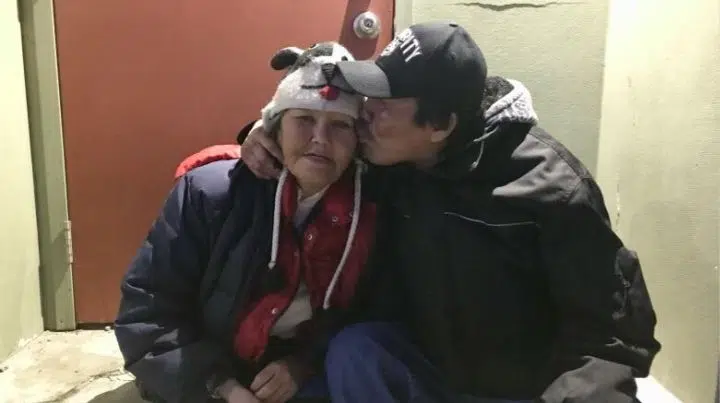NOTE:
This article was originally published on Thursday, September 30th, 2021 at 11:28 a.m. It has been updated and revised to be republished for 2024 to retell Sophie’s story.
This is a story that I’ve wanted to write for years now.
I was born in Milton, Ontario. I grew up in Georgetown. I went to broadcasting school in Kitchener at Conestoga College. I was terrified to graduate and not find a job, so I signed a contract with the first radio station that would take me.
That decision took me to Yellowknife, Northwest Territories.
The city isn’t for everybody. It’s cold, bitter, poorly funded, and it has a debilitating homelessness issue. It’s also where I had my eyes opened to the issues that faced, and continue to face Indigenous peoples in this country.
“We live in a great country, but it’s not always great for everybody.”
It’s been repeatedly said by Canadians over the last few years: “I didn’t know this was a thing,” or “they didn’t teach us this in school,” and those statements are true to some degree. I knew that Indigenous peoples suffered throughout Canada’s history. I’d heard the term ‘residential school’. I didn’t know what they really were nor the impact they had on people’s lives. I also didn’t know how recently they were still in existence.
Living in Yellowknife, I met a lot of people – good people. It’s the good people I miss the most. Minus 55 wind chill on Boxing Day that freezes my minivan’s engine? No, thanks. I had to walk to work everyday for four months after that because I was too busy with work to winterize my vehicle. Rookie mistake.
One of the people I miss the most is Sophie Thrasher. I met her on a run to Tim Hortons one morning. She was a well known woman in the city. Unfortunately, she was homeless. She was beautiful, though. I don’t mean that in a crude manner – she had a beautiful soul. Her smile lit up her entire face and it warmed your heart.
Sophie told me her life story the first day I met her. She was personable in that sense, and it never felt intrusive. How she explained it to me was that she was from somewhere in the northern parts of Northwest Territories, I believe she said either Inuvik or Tuktoyaktuk, and she was happy there. At some point, she came to Yellowknife and wound up stuck in the city. No home, no help, nothing. This was common for the homeless people in Yellowknife. I’ve been told that some were sent to the city to stand trial for petty crimes that were committed in their community, and then never given help to get back home.
Being homeless in Yellowknife is different than what someone in, say Milton, would experience. Not to undermine the experience of someone who’s homeless in Milton, but when a city borders the arctic circle, it’s not the most fun to stay outdoors for too long in the cold.
Many turn to alcohol and drugs to keep them occupied, if not just warm. Alcoholism is a major issue in YK. Mouthwash containing alcohol has to be locked up in grocery stores because alcoholics with no money would steal the bottles, bring them out into the minus 40-50 degree weather, wait for the alcohol and other ingredients to separate in the cold, and then cut the bottle in half to drink the alcohol.
That’s a long about way of saying that Sophie had a substance abuse issue. Because of course she did. That doesn’t change how I view her, and it shouldn’t change how you view anyone. She was a good person, one of the purest souls I’ve ever met, and that’s what matters to me.
After 13 months of working at my draining job at a Yellowknife radio station, I gave a six-weeks notice. I figured that allowed enough time for the station to find a suitable replacement and have them make the trek up to the North. I was fired after two weeks.
That was late-April 2018. In early-May 2018, I read the devastating news that Sophie Thrasher had passed away. She was 54-years-old.
I think about Sophie often. I think about how a system forgot her. People saw her every single day. She met new people every single day. Every single day she made new friends.
We live in a great country, but it’s not always great for everybody. When people hear about trauma from residential schools, they may only think that it applies to the survivors. That’s simply not the case. It applies to their families, and the following generations. Trauma is passed down in the most heartbreaking fashion to where you have a 16-year-old Indigenous boy being told by his parents that he shouldn’t go to school because it won’t matter anyway. You may read that statement and blame the parents – no, blame the trauma. Blame the system that fed the trauma.
The National Day for Truth and Reconciliation means a lot to me because it’s a step towards helping people like Sophie. People that never had a chance to live their life. On this day, educate yourself. Listen, learn, and understand that Indigenous peoples have been screaming for help for generations. Let’s give them that help.
In 2021 when this article was first published, the Town of Milton provided some local resources. I’d like to share them again:
- Mississaugas of the Credit First Nation Treaty Lands & Territory
- Grandmother’s Voice
- Truth and Reconciliation Commission
- Aboriginal Healing Foundation
- Beyond 94 Truth and Reconciliation in Canada
- Reconciliation in Canada
Thank you.
Cameron Wilkinson












